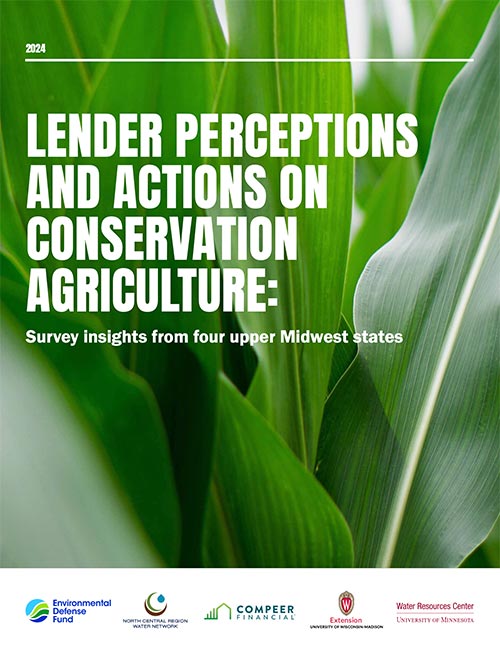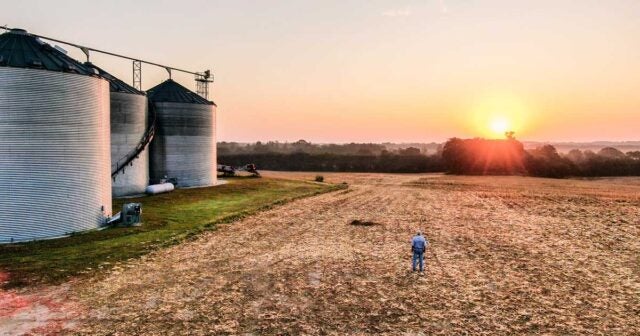- Resources
- Lenders want to support farmers’ conservation efforts. Here’s how their executives can help.
Resources
Lenders want to support farmers’ conservation efforts. Here’s how their executives can help.
Published: February 7, 2024 by EDF Staff
A new survey of agricultural lenders in the upper Midwest reveals important insights about their perceptions and support for farmers’ conservation efforts. As the first of its kind, the survey can inform agricultural lending institutions’ climate and sustainability strategy development.
Farmers rely on agricultural lending institutions for loans to cover equipment, land and operating expenses. In particular, loan officers at these institutions hold relationships with farmers and are often seen as trusted advisers and sources of information. Their perspectives and knowledge of conservation agriculture can significantly influence farmers’ progress in adopting conservation practices.
179 loan officers participated in this survey across the states of Minnesota, Wisconsin, Iowa and Illinois. Fifty-one percent of the surveyed loan officers said that agricultural conservation is very or extremely important to them personally, and 59% believe it is very or extremely environmentally beneficial. Despite this, many loan officers face challenges supporting their farmer clients’ conservation investments. This is where the support of executives at agricultural financial institutions becomes essential.
Drawing from the firsthand insights obtained from the survey of loan officers conducted by EDF, University of Wisconsin-Madison Division of Extension, University of Minnesota Water Resources Center and Compeer Financial, here are the specific actions executives at agricultural finance institutions can take to support conservation investments.
Provide educational opportunities on conservation for loan officers.
A key challenge hindering loan officers in supporting their clients’ conservation efforts is a lack of knowledge about the financial implications of conservation practices. Forty-two percent of the respondents identified a lack of knowledge about the financial costs and benefits of conservation investments as a significant barrier in supporting clients who want to include conservation practices in their loan proposals. Only 15% of the surveyed loan officers consider themselves very or extremely knowledgeable about the financial impacts of conservation practices, and 44% feel moderately knowledgeable.
To address loan officers’ knowledge gaps, leadership at agricultural finance institutions should provide targeted education and training on the financial impacts of conservation. These programs can be developed by engaging with trusted partners such as local producers with first-hand experience implementing conservation practices, university extension services and researchers, conservation professionals and relevant government agencies. The Conservation Economics & Finance Resource Hub developed by the authors of this survey offers a valuable resource for creating these training programs.
Support financial data analysis efforts on conservation practices.
Eighty-six percent of the survey respondents believe that having information on the financial implications of conservation practices would enable them to better support their farmer borrowers interested in these practices. Agricultural finance institutions should support projects that collect and analyze financial data on conservation practices and share the results with their staff.
One example of such initiatives is EDF’s collaboration with the Center for Farm Financial Management at the University of Minnesota, the Minnesota Farm Business Management program and other partners to gather and analyze cover crop financial data from 121 Minnesota farms across four crops and five cover crop types. The detailed farm financial data and insights from this project over the next few years will help answer questions about the profitability of cover crops and inform loan officers who engage with farmer clients implementing cover crops.
Develop an internal strategy that supports conservation investments.
When asked about practices that reduce the agriculture sector’s contribution to climate change, only 17% of the respondents feel increased pressure from their institution’s leadership to support these mitigation practices. This aligns with research from EDF and Deloitte indicating that only 8% of agricultural finance institutions in the United States are significantly factoring climate change into their decision-making.
These gaps reflect a lack of a comprehensive internal strategy to support conservation investments. To address them, leadership at agricultural finance institutions should proactively develop conservation strategies and integrate them into a broader climate or sustainability strategy to help their farmer borrowers take advantage of conservation opportunities. Leaders can learn from the climate strategies guide for agricultural finance institutions, published by EDF and Deloitte in 2023. It presents five strategies agricultural finance institutions can implement to address climate-related risks and opportunities for their business and borrowers.
Help loan officers help farmers achieve conservation success.
It is evident that loan officers believe in the importance of conservation practices and are motivated to support their farmer borrowers, but they lack the necessary tools to do so effectively. It is critical for leadership to support them with well-defined strategies, comprehensive education and access to relevant data. By empowering loan officers, agricultural finance institutions can unlock substantial opportunities for farmer borrowers to invest in conservation practices.
Lender perceptions and actions on conservation agriculture
Survey insights from four upper Midwest states

Our Experts

-
Financial Solutions for Agricultural ResilienceLearn more





